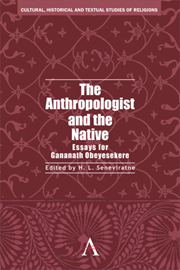Book contents
- Frontmatter
- Contents
- Editor's Note
- The Anthropologist and the Native: Essays for Gananath Obeyesekere
- SECTION I THE INDIAN TRADITION AND ITS REPRESENTATION
- SECTION II CASTE, KINSHIP, LAND AND COMMUNITY
- SECTION III RENUNCIATION AND POWER
- SECTION IV BUDDHISM TRANSFORMED
- SECTION V THE ENIGMA OF THE TEXT
- SECTION VI THE ANTHROPOLOGIST AND THE NATIVE
- Plain Tales from the Field: Reflections on Fieldwork in Three Cultures
- The (Re)Turn of the Native: Ethnography, Anthropology, and Nativism
- The Romance of the Field?
- Human Rights and ‘Practical Rationality’ among Sri Lankan Tamils and Americans
- List of Contributors
The Romance of the Field?
from SECTION VI - THE ANTHROPOLOGIST AND THE NATIVE
Published online by Cambridge University Press: 05 May 2012
- Frontmatter
- Contents
- Editor's Note
- The Anthropologist and the Native: Essays for Gananath Obeyesekere
- SECTION I THE INDIAN TRADITION AND ITS REPRESENTATION
- SECTION II CASTE, KINSHIP, LAND AND COMMUNITY
- SECTION III RENUNCIATION AND POWER
- SECTION IV BUDDHISM TRANSFORMED
- SECTION V THE ENIGMA OF THE TEXT
- SECTION VI THE ANTHROPOLOGIST AND THE NATIVE
- Plain Tales from the Field: Reflections on Fieldwork in Three Cultures
- The (Re)Turn of the Native: Ethnography, Anthropology, and Nativism
- The Romance of the Field?
- Human Rights and ‘Practical Rationality’ among Sri Lankan Tamils and Americans
- List of Contributors
Summary
Introduction
‘The field’ and ‘the field trip’ are central tropes in the world of development practice. Whilst some development people work ‘in the field’, most are based in cities and towns, whilst others —visitors from head office or regional offices or consultants visiting for specific purposes— are even further from ‘the poor’ whom the development industry is meant to benefit. But for all, visits to ‘the field’ are highly significant moments where the development professional and the ‘native’ come face to face.
Yet precisely what the point is of these visits to ‘the field’ remains unclear. The trips by expatriate or foreign development personnel to urban slums or rural villages obviously have an importance to those who undertake them, but what can be gained through a few hours in a slum or a few days visiting remote fishing villages in Southeast Asia is uncertain. After all, such visits are carefully orchestrated and usually closely controlled, ‘development tourism’ of the most extreme sort. To an anthropologist even calling such jaunts ‘field visits’ is clearly to imbue them with qualities which they lack. And the clear contrast is made between ‘fieldwork’ —the sort of thing anthropologists do over long periods of time and which generate ‘authentic’ knowledge', and ‘field visits’— the sort of thing which development people do and which simply reinforce stereotypes and prejudices.
- Type
- Chapter
- Information
- The Anthropologist and the NativeEssays for Gananath Obeyesekere, pp. 445 - 470Publisher: Anthem PressPrint publication year: 2011
- 1
- Cited by

